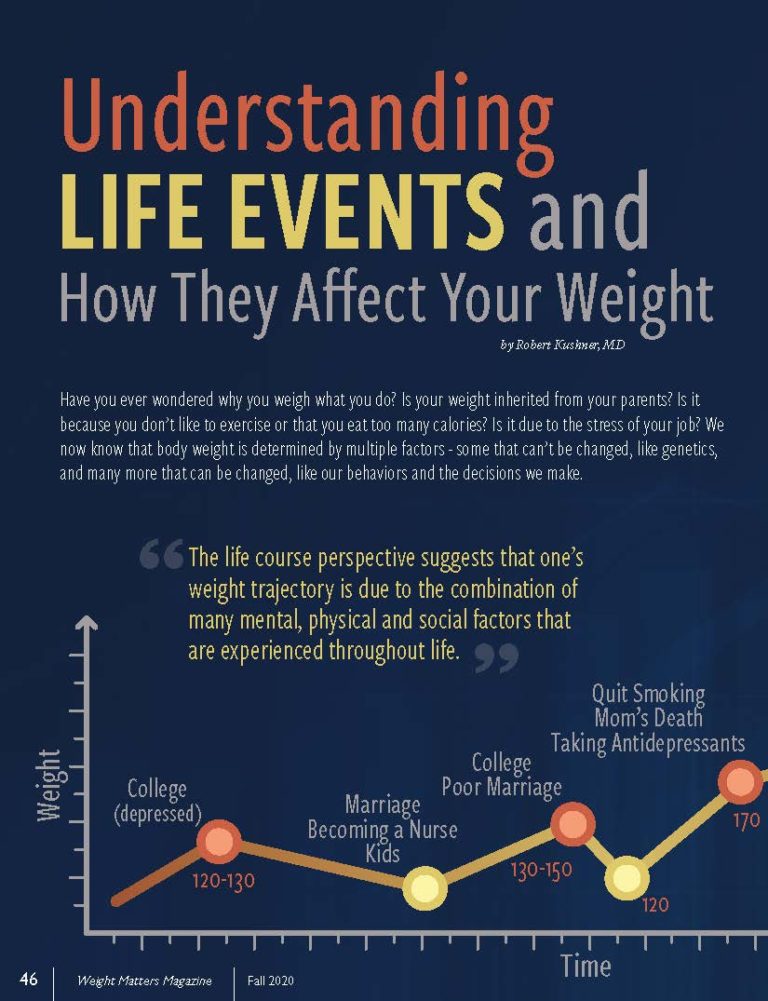Understanding Life Events and How They Affect Your Weight


by Robert Kushner, MD
Fall 2020
Have you ever wondered why you weigh what you do? Is your weight inherited from your parents? Is it because you don’t like to exercise or that you eat too many calories? Is it due to the stress of your job? We now know that body weight is determined by multiple factors – some that can’t be changed, like genetics, and many more that can be changed, like our behaviors and the decisions we make.
The Life Course Perspective
The life course perspective is a theory used in the social sciences that looks at how a person grows and changes over time. This perspective suggests that one’s weight trajectory is due to the combination of many mental, physical and social factors that are experienced throughout life. When we reflect on these factors, as well as how we react to them, we can gain a deeper understanding of our weight and determine ways to address or treat it.
One method you can use to identify the important periods in your own life is to make a ‘Weight-Life Events Graph’ like the one below. After drawing a vertical line for Weight and a horizontal line for Time, you can then graph your weight, marking the life events and diet attempts that may have contributed to your current weight.
In this example, the person who created the graph identified multiple events over her life that she considers to be related to her weight, beginning with college and ending with living alone. The next step in the reflection process is to learn how to interpret the graph.
Understanding Life Events
Life events that influence weight can be categorized into four general factors:
Biological
Biological events affect our underlying physiology and metabolism which influence:
- Appetite
- How we burn calories
- How we store fat
We all experience biological changes with aging that include loss of muscle mass and a gradually slowing metabolism. Two common biological events in a woman’s life that may cause changes in weight or body shape are pregnancy and menopause.
Discontinuing the use of tobacco may also lead to weight gain by lowering metabolism, which means that less calories from food are being burned. Not getting enough sleep can also lead to weight gain by affecting your appetite and nervous system, increasing insulin resistance and changing your circadian rhythm (an internal process that regulates your body’s natural sleep-wake cycle).
Other medical problems that can contribute to weight gain include:
- Hypothyroidism – A condition in which your thyroid gland doesn’t produce enough of certain crucial hormones.
- Polycystic Ovaries (PCOS) – A hormonal disorder that is common among women of reproductive age.
- Cushing’s Disease – Occurs when your body is exposed to high levels of the hormone cortisol (steroids) for a long time.
- Hypothalamic Obesity – This can cause damage to the eating center of the brain and may cause sudden, quick and dramatic weight gain.
Another common cause in this category is unintentional weight gain resulting from prescribed medications. The most frequent offenders are drugs prescribed for:
- Diabetes (Insulin and Sulfonylureas)
- Depression (Paroxetine and Mirtazapine)
- Schizophrenia or bipolar disorder (Olanzapine, Clozapine, Divalproex sodium)
- Inflammatory diseases (Prednisone)
Social & Habitual
College, marriage, raising children, jobs, commute time, retirement, family holidays, neighborhood environment and income level are just some of the examples of social and habitual factors that either encourage or hinder healthy eating and physical activity. For most of these events, overeating or changes in eating habits are either closely related to the occasion or happen as an unintended consequence.
This category also includes an environment where large volumes of ultra-processed, high-calorie, enticing foods are available 24/7 at the same time that physical activity has been engineered out of our daily lives. For many people, food deserts (areas where access to food is scarce) and limited access to safe leisure-time activities (like going on a neighborhood walk) contribute to the differences we see in obesity among minority populations.
Psychological
It is not necessarily the events in our lives that change our weight, but how we interpret and react to them. In other words, it’s all about how you cope with changes and perceive the stresses of life.
Whereas positive coping styles include self-help strategies (such as problem-solving, seeking out social support and emotional expression to deal with stress), negative coping styles are characterized by disengagement (like vegging out on the couch), avoiding the problem, wishful thinking, social withdrawal and self-criticism.
Negative coping is also associated with more anxiety, depression, loneliness, stress eating and weight gain. Learning more adaptive strategies to address stressful life events is an important goal to have with weight management.
Along with low self-esteem and body dissatisfaction, the psychological category also includes other factors:
- Binge Eating Disorder – A serious eating disorder in which a person frequently consumes unusually large amounts of food, is unable to stop eating, and feels guilty or embarrassedby the behavior.
- Adverse childhood experiences (ACE) – Traumatic events occurring before age 18 that include all types of abuse and neglect as well substance use, divorce and domestic violence.
- Weight discrimination – A problem in society that can lead to internalized weight bias. In other words, we take on the stigmatizing attitudes of others that are based on social stereotypes which can have damaging psychological effects. These effects can include reduced quality of life, symptoms of depression and anxiety, low self-esteem, poor body image and behavioral problems such as disordered eating behaviors and avoiding exercise.
Cognitive Factors that Influence Weight Change
Weight gain:
- Dichotomous thinking – The tendency to think in terms of polar opposites, such as ‘good or bad’ or ‘black or white.’
- Dissatisfaction with weight achieved – Concern about weight or shape.
- Novelty seeking – A personality trait associated with impulsive decision making, extravagance in approach to reward cues, quick loss of temper, and avoidance of frustration.
- Lower persistence – Ability to follow a course of action despite difficulty or opposition.
- Lower self-directedness – Ability to regulate and adapt behavior to the demands of a situation in order to achieve personally chosen goals and values.
Weight loss:
- Conscientiousness – The degree to which we control, regulate and direct our impulses.
- Vigilance – Keeping careful, devoted attentiveness and watch over our behaviors.
- Self-efficacy – The belief we have in our own abilities, specifically our ability to meet the challenges ahead of us and reach our goals.
- Self-regulation – Controlling our behavior, emotions and thoughts in our pursuit of long-term goals.
Cognitive
The last category of factors that impact body weight are cognitive – the conscious actions we take that are related to thinking, reasoning, remembering, perceiving and judging. Some of these attributes are characteristics of our personality that are associated with a tendency to gain or lose weight.
These underlying attributes will not turn up on a ‘weight-life events graph,’ but they often help to explain the reason for why we gain weight or lose it.
For example, struggling to maintain weight loss after participating in a weight loss program may be partly due to challenges with sticking to plans. Or, someone with the continuous need to seek out novelty may be more likely to try one new diet after another, even if they experience early success. Another person who needs frequent and ongoing accountability from a program in order to stay on track may have lower self-directedness.
These attributes should not be considered as character faults, but rather as factors that may lead us to think or behave a certain way in a given situation. It is important for all of us to recognize whether we identify with any of these attributes and their effects
on our ability to reach our goals – even those that aren’t
weight-related. Under the guidance of a health care professional or even a self-help book, we can learn to change negative or sabotaging ways of thinking in order to find personal success.
A Guide to Targeted Treatment
Constructing your own ‘Weight-Life Events Graph’ and deciphering its meaning can help you learn from the past and then move forward. It can also help you achieve greater self-awareness and understanding of your weight, which can then help you reduce self-blame, increase self-compassion and have a more targeted approach to weight management.
About the Author:
Robert Kushner, MD, is Medical Director of the Center for Lifestyle Medicine at Northwestern Medicine in Chicago; Professor of Medicine and Medical Education at Northwestern University Feinberg School of Medicine; Past President of The Obesity Society (TOS), a founder of the American Board of Obesity Medicine (ABOM) that certifies physicians in the care of patients with obesity; and Co-chair of the annual Obesity Action Coalition (OAC) Your Weight Matters Convention. For more about Dr. Kushner, visit DrRobertKushner.com and take his Six Factor Quiz online.
by Kendall Griffey, OAC Communications Manager Spring 2024 We have officially kicked off Your Weight Matters Regional…
Read Articleby Robyn Pashby, PhD Winter 2024 “No one is ever going to date you if you don’t…
Read Articleby Michelle “Shelly” Vicari Winter 2024 Winter has arrived! Don’t allow the chilly and damp weather to…
Read Article








